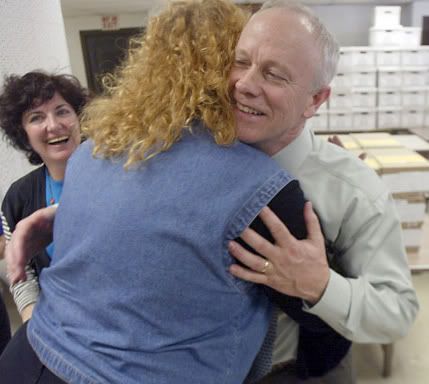(The DCCC announced that they were pleased with McNerney, is this what they have been pushing him to do? – promoted by Julia Rosen)
Back in 2006, when Jerry McNerney was running for Congress in CA-11, he would appear at forums, meetings and fundraisers where he would often be called upon to speak. One of the lines he used often, usually to thundering applause, was “I am a Barbara Boxer Democrat!” Never once did he say, “I am a Dennis Cardoza Democrat!” I suspect his audiences might have reacted a little more coolly if he had.
And yet his stance on the issues to date has more closely mirrored that of Rep. Dennis Cardoza (CA-18), who is well known for his conservative Blue Dog associations. Why is McNerney making this rightward shift?
Well, I’ve given McNerney the benefit of the doubt over the last seven months, preferring to think that he was getting bad advice from his Chief of Staff, Angela Kouters. I figured that Kouters, who is young, ambitious, inexperienced and thoroughly under the influence of Inside-the-Beltway conventional wisdom, was urging him to take so-called “moderate” positions in an attempt to pander to the DC perception of conservative CA-11 residents.
But it appears that I may have been mistaken. Unfortunately, the news today has brought two separate stories which have led me to the difficult conclusion that Jerry McNerney is not the man he appeared to be. That is to say, it sure seems like he duped many of his strongest supporters.
See why on the flip…
After voting last Thursday against the Hinchey amendment to H.R. 3093, an amendment that would have prevented federal prosecution for medical marijuana usage in the twelve states which have legalized it, he offered this explanation in today’s Sacramento Bee:
McNerney insists he is not a Pelosi clone. Last week, for example, he broke ranks with most California Democrats by voting against an amendment to ban use of federal money to prosecute growers of medicinal marijuana.
“I’m a moderate,” he said.
Well, I hate to break it to the Congressman, but that was not a “moderate” vote. The amendment was co-sponsored by Rep. Dana Rohrabacher (CA-46) — yes, you heard me. Jerry McNerney is to the right of Crazy Dana Rohrabacher. If McNerney had bothered to look at the Field poll done back in 2004, he would realize that Californians statewide support the legalization of medical marijuana by close to a three-quarters majority. Even two-thirds of Republicans support it. Here’s a newsflash to Jerry McNerney. When only 24% of the residents of your state support your position, it’s not moderate. It’s extreme… extreme right-wing.

But almost as bad as his Hinchey vote is the news coming from Germany today. Rep. McNerney led a bi-partisan delegation of Congressional freshmen to Iraq over the weekend. On his way home from Iraq, McNerney participated in a conference call with reporters during a layover.
From the Stockton Record:
[McNerney] said his conversations convinced him that, at least in Ramadi, the U.S. military was indeed making progress. […]
McNerney said he will be more likely to listen to those who want more time in Iraq.
“If anything, I’m more willing to participate in a give-and-take with that viewpoint than I was before,” he said.
Congress is scheduled to vote on a major defense bill this week that may contain a provision creating a timetable for withdrawal of troops.
From USA Today:
McNerney, the California congressman, also said he saw signs of progress in Ramadi and was impressed by Petraeus, who argued in favor of giving President Bush’s troop surge strategy time to work.
McNerney said he still favors a timeline to get troops out of Iraq — something House leaders may bring to the floor again this week as part of a defense spending bill — but is open to crafting it in a way more favorable to generals’ wishes.
“As long as we start at a certain date I’d be willing to be a little more flexible in terms of when it might end,” McNerney said.
From Josh Richman:
Arriving in Baghdad on a C-130 from Kuwait, he met first with officials including Gen. David Petraeus, whom he said is working very hard and is “very optimistic about what’s happening in the conflict… He’s concerned about being given enough rope to finish the job here.” […]
“We need to put a timetable out there, it needs to make sense,” McNerney added — a plan to bring the troops home, so that the Iraqi government is compelled to unite and take over the task of securing the country. “I think we can work to find a way forward that would be bipartisan, that would accomodate the achievements they have had in the last four or five months.”
And from the Contra Costa Times:
Leading the delegation was Rep. Jerry McNerney, D-Calif., who said he saw signs of progress in Ramadi in Anbar province and was impressed by Gen. David Petraeus, President Bush’s top military commander in Iraq, who argued in favor of giving Bush’s troop surge strategy time to work.
McNerney said he still favors a timeline to get troops out of Iraq — something House leaders may bring to the floor again this week as part of a defense spending bill — but is open to being flexible “in terms of when it might end.”
[Update] And in a later AP story from the Fresno Bee:
“I’m more willing to work with finding a way forward to accommodate what the generals are saying,” McNerney told reporters Monday during a conference call from Germany on his way back to the U.S.
I have a hard time figuring out how Jerry McNerney’s latest words and deeds have anything to do with being a “Barbara Boxer Democrat.” I know, I know, it’s better than Richard Pombo. But is this what we all really put our sweat and blood into? How has the reality of Congressman Jerry McNerney differed from what we might have expected from his primary opponent, the DLC-anointed Steve Filson? How do we, as a progressive movement, demand accountability from the candidates that we support? When they turn their backs on us and our issues, do we just shrug our shoulders and settle for scraps? I’m genuinely at a loss. What do you think?
Cross posted at The Progressive Connection


 Seems like it’s about time for Ellen Tauscher to check herself into Interfering Politician Rehab. You might have thought that after last year’s Steve Filson debacle in the CA-11 primary, she’d have gotten the message that Democratic voters are perfectly capable of choosing their own candidates. But nooooo, the woman is out of control.
Seems like it’s about time for Ellen Tauscher to check herself into Interfering Politician Rehab. You might have thought that after last year’s Steve Filson debacle in the CA-11 primary, she’d have gotten the message that Democratic voters are perfectly capable of choosing their own candidates. But nooooo, the woman is out of control. 
 Back in 2004, a small group of committed activists worked to support Jerry McNerney in his initial race against Richard Pombo. Not very many people, bloggers or non, had heard of McNerney back in those days. But in 2005, as the `06 race started taking shape, that core group of mavens brought more and more new people to the table, and the grassroots/netroots phenomenon of the McNerney campaign began to take form. Even so, right up until the June primary, when McNerney decisively beat the DCCC’s much better funded candidate, Steve Filson, there just weren’t that many people who took McNerney seriously. And even after the primary, the McNerney/Pombo race was routinely considered second tier. It wasn’t until the last few heady months of the ’06 race that more casual observers began to share the faith in McNerney that had been demonstrated by his core grassroots supporters all along. And, of course, now that he’s a Congressman, everyone has jumped on the bandwagon, basking in the McNerney glow.
Back in 2004, a small group of committed activists worked to support Jerry McNerney in his initial race against Richard Pombo. Not very many people, bloggers or non, had heard of McNerney back in those days. But in 2005, as the `06 race started taking shape, that core group of mavens brought more and more new people to the table, and the grassroots/netroots phenomenon of the McNerney campaign began to take form. Even so, right up until the June primary, when McNerney decisively beat the DCCC’s much better funded candidate, Steve Filson, there just weren’t that many people who took McNerney seriously. And even after the primary, the McNerney/Pombo race was routinely considered second tier. It wasn’t until the last few heady months of the ’06 race that more casual observers began to share the faith in McNerney that had been demonstrated by his core grassroots supporters all along. And, of course, now that he’s a Congressman, everyone has jumped on the bandwagon, basking in the McNerney glow.